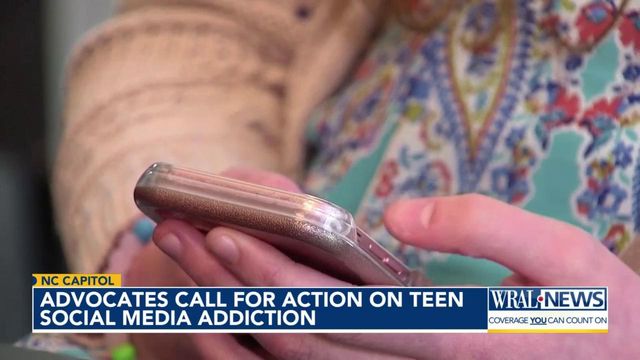Child health advocates call for action on social media algorithms, teen mental health
The state's top policy group on children's welfare is asking state lawmakers to take action to help keep children from becoming addicted to social media. It's also calling for additional recurring funding for school social workers, counselors, psychologists and nurses.
The recommendations were approved Wednesday by the North Carolina Child Fatality Task Force, a panel made up of experts, advocates, and policymakers on children's health issues. The panel creates an action list each year that's distributed to state lawmakers, state agencies and advocacy groups.
The group heard a presentation by Dr. Eva Telzer, a University of North Carolina at Chapel Hill researcher investigating the effects of social media on teens' neurological and social development. According to Telzer, 78% of teens 13 to 17 report checking social media hourly, and 46% say they check it constantly, almost double the number who reported that five years ago.
Many are also reporting symptoms of addiction to social media, Telzer said.
Telzer said her research group has been conducting longitudinal research over multiple years to watch teens' brains develop. She said they've found differences in the development of teens who are heavy users of social media.
"For habitual social media users, the brain is becoming hypersensitive to receiving social feedback from peers. So this is really setting the stage for lifelong development of the brain well into adulthood," Telzer told the panel. "It may be changing the way the adolescents may be experiencing online social relationships, and may exacerbate an already sensitive brain, really further tuning adolescents to seek out more social reports."
The group also heard a presentation from Sam Hiner, executive director of the Young People's Alliance at the University of North Carolina at Chapel Hill. Hiner said social media use has increased eating disorders, loneliness and political extremism among his peers because of the way its algorithms work, feeding users more and more content that may be harmful to their mental health.
The recommendation endorses "legislation that addresses addictive algorithms in social media that harm children."
A bipartisan bill filed in 2023 would have banned social media companies from collecting data for users younger than 18 without their consent, and would have required them to implement better age verification. But the bill died in committee after extensive lobbying by social media companies.
Meta, which owns Facebook and Instagram, told WRAL News earlier this year that the platforms are already taking steps to protect young users.
“We automatically set teens’ accounts to private when they join Instagram, and we send notifications encouraging them to take regular breaks,” the Meta statement said. “We don’t allow content that promotes suicide, self-harm or eating disorders, and of the content we remove or take action on, we identify over 99% of it before it’s reported to us.”
Hiner conceded the platforms have taken some action to 'filter out harmful content," but said it's not enough.
"The companies won't regulate the algorithms because it's in their profit interest to keep young people online for as long as possible so they can sell more ads. So that's why regulation is needed," Hiner said.
The task force also approved a recommendation for recurring funding to increase the numbers of school nurses, social workers, counselors and psychologists in North Carolina schools, "to support the physical and mental health of students and to move North Carolina toward achieving nationally recommended ratios for these professional positions in schools."
Most North Carolina schools are far below national recommendations for the number of school nurses, counselors, psychologists and social workers needed to serve their student enrollment numbers.
Over the past few years, state lawmakers have used federal COVID relief money to boost funding in those areas, creating more positions. But that federal funding they used was one-time money that will run out at some point.
The task force is asking state lawmakers to provide state dollars to keep those positions funded permanently.
Children's mental health guide
WRAL News has compiled a guide of mental health resources for people in North Carolina and throughout the country.











